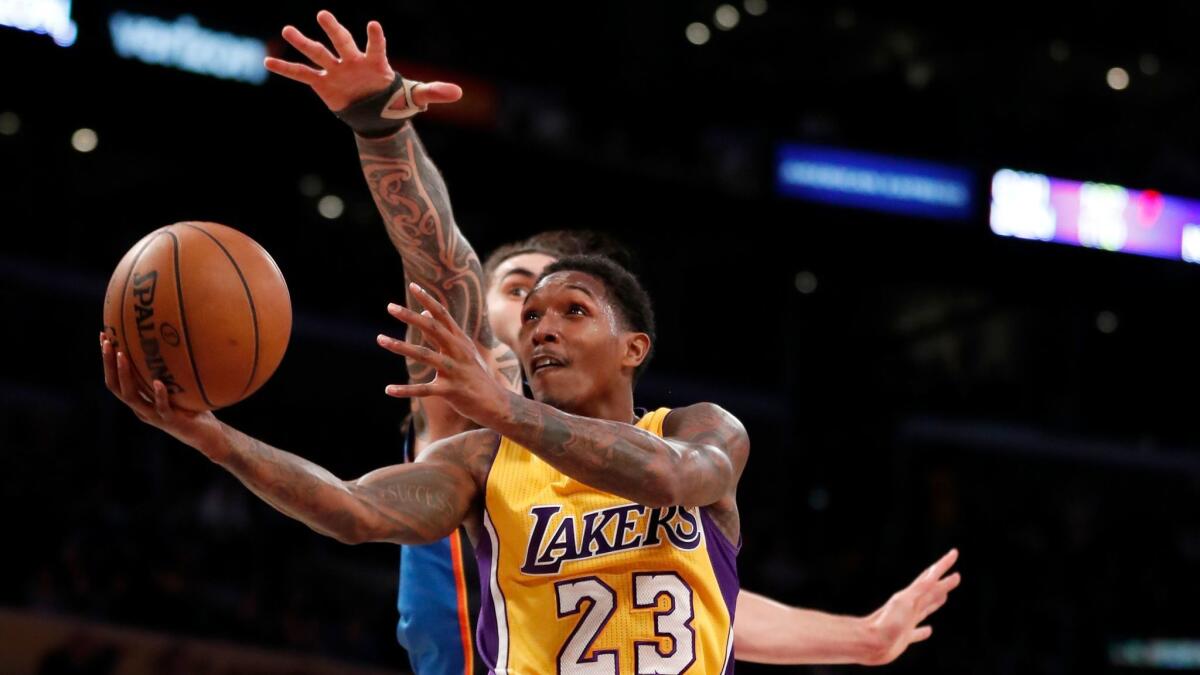Lakers guard Lou Williams provides needed late-game scoring

- Share via
With two hurt starters and other players with nagging injuries, Lakers Coach Luke Walton has spent the last week pouring over each and every lineup that could help his team win games.
So when Walton made a joking suggestion as to how he may use Lou Williams on his team’s upcoming road trip, it was fair to imagine it popping up at a recent brainstorming session in the coaches’ meeting room.
“Maybe we should just start benching him in the first half and just play him in the fourth quarter,” Walton said at the Lakers’ practice facility on Monday. “He’s pretty good in the fourth.”
The idea is satirical in two ways: Walton needs Williams to play about 24 minutes per game, and Williams is much better than “pretty good” in the fourth quarter. Williams, a 12th-year guard and an integral part of the Lakers’ second unit, is averaging 7.6 points per fourth quarter this season. That is tied for third in the league with Sacramento Kings center DeMarcus Cousins. They are only behind Oklahoma Thunder guard Russell Westbrook (10.3 points per fourth), Portland Trailblazers guard Damian Lillard (8.2) and Boston Celtics guard Isaiah Thomas (8.2).
The Lakers (9-9) start a four-game road swing against the New Orleans Pelicans (6-12) at 5 p.m. on Tuesday. They will be without starting point guard D’Angelo Russell (sore left knee); power forward Julius Randle (hip pointer) remains questionable. The injuries to the Lakers’ top two playmakers only heighten the need for Williams’ late-game scoring punch. He led the Lakers with 21 points in their 15-point win over the Atlanta Hawks on Sunday, and 13 of them came in the fourth.
“I just think he likes the moment,” Walton said. “The bigger the moment gets, the more comfortable or confident he feels.”
Williams is averaging 16.6 points per game this season, with nearly half of his points in the fourth. That is not the case for the league’s other top fourth-quarter scorers, who also all happen to be the focal points of their team’s offenses.
Westbrook averages 30.9 a contest, and Lillard (28.2), Thomas (26) and Cousins (28.7) all score above 25 points per game. Right below these five on the fourth-quarter scoring is a host of stars and All-Stars: the Toronto Raptors’ Kyle Lowry, the Cleveland Cavaliers’ Kyrie Irving, the Pelicans’ Anthony Davis, the San Antonio Spurs’ Kawhi Leonard, and so on. The next bench player on the list is Memphis Grizzlies forward Zach Randolph, who is averaging 5.5 points per fourth quarter and was a career starter until this season.
But these are not the only ways Williams stands out in this group of elite players.
A player’s usage rate measures how many possessions end with him making a shot, missing a shot or committing a turnover while he is on the court. It essentially indicates how involved a player is in his team’s offense. Westbrook, Lillard, Thomas and Cousins all rank in the top five of fourth-quarter usage rate.
Williams ranks 16th with a fourth-quarter usage rate of 31.7 (more than 20 points below Westbrook’s at 52.6). Yet his production does not indicate that, making Williams both effective and uniquely efficient in the fourth quarter.
Part of this can be attributed to how good Williams is at drawing fouls. On the season, 22.4% of his points have come at the free-throw line. That jumps to 28.5% in the fourth quarter, and Williams’ went six for six on fourth-quarter free throws against the Hawks.
“I understand coverages, so I understand a lot of times teams are going to push me right, they don’t want me to get to my left hand,” Williams recently told reporters of how he draws fouls so often. “So if I jab right and go left you’re probably going to try to cut me off cause your coach is going to get mad, you’re probably going to run into me and I’m just going to shoot the ball.”
Then there is Williams’ knack for the big moment. It is not as explainable, or explainable at all. As long as it continues, the Lakers do not need it to be.
jesse.dougherty@latimes.com
Twitter: @dougherty_jesse
More to Read
All things Lakers, all the time.
Get all the Lakers news you need in Dan Woike's weekly newsletter.
You may occasionally receive promotional content from the Los Angeles Times.





